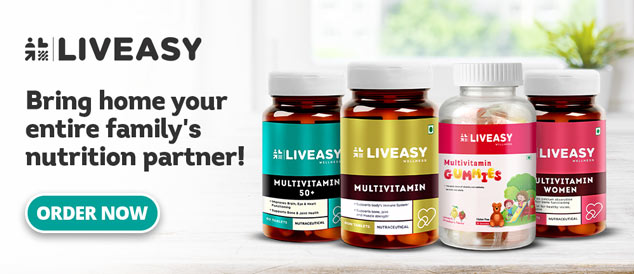According to Dr Abizer Manked (Consulting Physician and Diabetologist) from Saifee Hospital, micronutrients are known to be a major nutrient group that the human body requires. They include Vitamins –Vitamin A, vitamin B, vitamin C, vitamin D, vitamin E, and Minerals – Iron, calcium, magnesium, zinc and selenium.
There are 30 vitamins and minerals, called essential micronutrients, that your body cannot produce in sufficient amounts on its own. Scurvy, which causes bleeding gums and listlessness, was discovered centuries ago by British sailors who went months without eating fresh fruits or vegetables, the main source of vitamin C. People in many low-income countries suffer from a variety of nutrient-deficiency disorders even today.
Because our bodies do not create micronutrients in sufficient quantities, a diet rich in vitamins and minerals is needed for good health. Vitamins are organic and can be broken down by factors such as heat, oxygen or acid. This means that they can degrade when cooked or exposed to air, making it slightly harder to ensure that we consume enough of them in our diet. Minerals, on the other hand, are inorganic and do not undergo this process. This means that our bodies absorb minerals from the soil and water in which our food is grown.
While Vitamins are essential for the immune system, blood clotting and the consistent production of energy in the body, minerals play a vital role in maintaining bone health, growth, balancing fluids and a number of other processes. Micronutrients are also referred to as ‘essential nutrients’ as they form an important part of daily food, for the body to obtain the required vitamins and minerals.
Micronutrients, vitamins and minerals are broadly classified into four categories that include: water-soluble vitamins, fat-soluble vitamins, macro minerals and trace minerals. All of these are absorbed by the body in similar ways and tend to interact amidst processes within.
Water-soluble vitamins are known to dissolve easily and do not remain stored in the body if consumed in excess, as they get flushed out through urination. They include – Vitamin C (ascorbic acid) and the vitamin B complex: thiamin (B1), riboflavin (B2), niacin (B3), pantothenic acid (B5), Vitamin B6, biotin (B7), folic acid (B9), Vitamin B12 and Vitamin A (in its Beta-Carotene form). While each of them has an individual part to play, their functions are all interrelated.
B vitamins and vitamin C are two of the most important water-soluble vitamins. Because your body cannot store them for later use, you must consume more of them on a daily basis. Any water-soluble vitamins that your body does not utilize immediately away are excreted by the body. They also assist your body in obtaining energy. Additionally, they support the health of your cells, particularly red blood cells.
Conversely, fat-soluble vitamins do not dissolve in water and are known to get absorbed when consumed along with a source of fat, after which they are stored in one’s liver and fatty tissues, to contribute to functions in the future.
Vitamins A, D, E and K are among them. They can remain in your body for later usage once you obtain them. They are stored in fatty tissue and the liver of your body. They are beneficial to eye health as well as the immune system. They also aid in the healing of injuries.
With respect to essential minerals, Macro minerals are required in huge amounts in order to perform their respective roles in the body. They include – calcium, phosphorus, magnesium, sodium, potassium, chloride and sulphur. Trace minerals, on the other hand, include – iron, manganese, copper, iodine, zinc, cobalt, fluoride and selenium, and are required in small amounts to efficiently perform functions in the body.
Microminerals are a necessary component of the human diet. They’re essential for the health of your muscles and bones. They help to keep your blood pressure in check as well. Trace minerals are essential for muscle health, the functioning of the nervous system and cell damage repair.
Vitamins and carotenoids are key micronutrients facilitating the maintenance of health, as evidenced by the increased risk of disease with low intake. Micronutrients play a central part in metabolism and in the maintenance of tissue function. Clearly, micronutrients are an integral part of the immune system, and the body needs optimal levels for effective immune response.
Dr. M.G. Kartheeka, MBBS, MD
The prime benefit of a balanced amount of micronutrients in the body is to effectively support functions within. Vitamins and Minerals are essential for combating diseases, thereby improving the immune system, as they form an integral part of almost every internal process while maintaining one’s metabolism.
Some micronutrients also serve as antioxidants and aid in preventing oxidative cell damage, as well as lowering the risk of cancer and Alzheimer’s, among others. A number of them also fights to age.
As they are required in smaller amounts, micronutrients are commonly known as ”magic wands” as behind the scenes, they synthesize DNA and significantly contribute to the production of enzymes, and other important hormones in the body, which are crucial for the effective growth and development of the human body.
Abnormal intestinal absorption or defective transport across the intestinal wall due to intestinal surgeries, cancers, and critical illnesses are commonly implicated in the causation of micronutrient deficiencies.
Dr. Ashish Bajaj, M.B.B.S., M.D.
The deficiency of micronutrients is a global issue, as consuming lesser than the required amounts can create a host of harmful side effects in the body.
Micronutrient deficiencies can produce evident and potentially hazardous health problems, but they can also induce less clinically noticeable declines in energy, mental clarity and overall capacity. This can result in poor educational performance, decreased work productivity and an increased risk of contracting additional diseases and illnesses.
While adults are known to consume adequate vitamins and minerals daily through food and fluids, but on the other hand; women, children and senior citizens are prone to a deficiency of these essential micronutrients, which include – Vitamin D, Vitamin B12, Vitamin A, Iron and Calcium. These deficiencies are not only found in developing nations but also in developed ones.
B12 deficiency is commonly observed in people who adhere to a purely vegan diet, are taking certain medications, or suffer from diseases like atrophic gastritis, inflammatory bowel disease and other endocrinal disorders. Early symptoms of b12 deficiency, however, are usually very mild, such as irritation, lack of concentration, tingling sensation in one’s soles, etc.
As another vital micronutrient, the consumption of iodine through salt is imperative for growing children, and a deficiency of the same can cause severe brain damage. This tends to keep them away from attaining their intellectual and developmental potential.
Deficiency of iron is observed especially in women who need it the most. This leads to a higher risk of maternal mortality, and making a person prone to anaemia, resulting in weariness. Weak immunity is another long-term negative effect of iron deficiency. While the deficiencies of these micronutrients are not always visible or detected promptly, they can have significant adverse effects on the functioning of the body and mind, in the long haul.
Also Read: Honey Dew Fruit: Unraveling Its Research-Based Health Benefits
While supplements are a safe source of availing essential micronutrients and preventing any kind of deficiency, the most effective way is through the consumption of nutritious food.
Following are some of the foods that can be included in one’s daily diet to absorb required micronutrients: Vitamin A –cheese, milk, egg yolk, orange and yellow fruits and vegetables; Vitamin B –whole grains, nuts, seeds, legumes and leafy vegetables; Vitamin C and D–broccoli, cabbage, parsley, strawberry and citrus fruits; Vitamin E –olive oil, wholegrain cereals and avocado; Iron –leafy vegetables, legumes and lean meat; Calcium – almonds and dairy products; Magnesium – seeds, whole grains and nuts; Zinc – chicken, fish, pumpkin and sunflower seeds; Selenium – sunflower seeds, oats and wheat germ.
Also Read: Vitamin B Complex Benefits: Exploring Research-Based Health Perks
Disclaimer: The information provided here is for educational/awareness purposes only and is not intended to be a substitute for medical treatment by a healthcare professional and should not be relied upon to diagnose or treat any medical condition. The reader should consult a registered medical practitioner to determine the appropriateness of the information and before consuming any medication. PharmEasy does not provide any guarantee or warranty (express or implied) regarding the accuracy, adequacy, completeness, legality, reliability or usefulness of the information; and disclaims any liability arising thereof.
Links and product recommendations in the information provided here are advertisements of third-party products available on the website. PharmEasy does not make any representation on the accuracy or suitability of such products/services. Advertisements do not influence the editorial decisions or content. The information in this blog is subject to change without notice. The authors and administrators reserve the right to modify, add, or remove content without notification. It is your responsibility to review this disclaimer regularly for any changes.
Multivitamins are the secret ingredients your body needs to function at its best. We are talking about a group of nutrients, which includes vitamins and minerals. Our health is greatly reliant on them for growth, development, maintenance and proper functioning. The shortfall of even one type of vitamin or mineral can trigger any number of health issues.
There are so many different kinds of these nutrients that it is a Herculean task to source them all through food. So, what’s the alternative? Try a wholesome approach with LivEasy Multivitamin Tablets. You can give yourself a complete dose of all the vitamins and minerals to achieve optimal health!
Benefits of taking Multivitamin supplements
Taking multivitamin supplements have a number of health benefits. Some of them are the following:
LivEasy Multivitamin Tablets boasts an array of potent ingredients such as Ginkgo biloba extract, Grape seed extract, Panax Ginseng & choline along with vitamins and minerals. Consume LivEasy Multivitamin Tablets every day because its ingredients pack in several benefits.
LivEasy Multivitamin Tablets are a repository of Vitamins, A, C, D, E and B complex.
LivEasy Multivitamin Tablets are a treasure trove of minerals such as calcium, phosphorus, iron, zinc, magnesium, potassium, manganese, copper, iodine, chromium, selenium and molybdenum. What do minerals do for you?

Herb-based medicinal systems in India, China and Europe have been utilizing Gingko Biloba or Maiden Hair Tree extracts for ages. They contain a powerful antioxidant and prevent oxidative damage to your cells. Oxidative stress is responsible for cancer, inflammation, organ damage, hypertension and many similar health problems.
LivEasy Multivitamin Tablets contain extracts of grape seeds that are packed with vitamin E, bioflavonoids, linoleic acid, resveratrol- a further dose of antioxidants. They help to keep your blood sugar level stable and slow your bad cholesterol production. These antioxidants also prevent damage to skin cells and thus slow down ageing and the appearance of fine lines.

LivEasy Multivitamin Tablets can do much for your brain thanks to Panax ginseng extracts. These tablets will improve your brain function, enhance concentration and boost your memory. Its other functions include empowering your immunity and increasing your energy level. Consume LivEasy Multivitamin Tablets daily to boost brain function.

Choline acts as a positive catalyst for your neural activities. It helps in the production of acetylcholine- a neurotransmitter. Furthermore, choline is also necessary for the metabolism of fats. It is also responsible for preserving the structure of your cell membrane.
If just one tablet has so many life-transforming facilities, why not add it to your day-to-day life? Start consuming LivEasy Multivitamin Tablets every day to keep illnesses at bay.
| Product | Price |
| Neurobion Forte Tablet 30’s | ₹29.5 |
| Neurobio Forte Strip of 10 Tablets | ₹8.95 |
| Besosules Strip of 20 Capsules | ₹38.82 |
| Becosules Z Strip of 15 Capsules | ₹26.7 |
| Becosules Z Strip of 20 Capsules | ₹39.07 |
| Zincovit Strip of 15 Tablets (green) | ₹89.25 |
| Zincovit Strip of 15 Tablets (red) | 89.25 |
| Zincovit Tablet 10’s | ₹76.5 |
| Beplex Forte Strip of 20 Tablets | ₹33.05 |
Disclaimer: The information provided here is for educational/awareness purposes only and is not intended to be a substitute for medical treatment by a healthcare professional and should not be relied upon to diagnose or treat any medical condition. The reader should consult a registered medical practitioner to determine the appropriateness of the information and before consuming any medication. PharmEasy does not provide any guarantee or warranty (express or implied) regarding the accuracy, adequacy, completeness, legality, reliability or usefulness of the information; and disclaims any liability arising thereof.
Links and product recommendations in the information provided here are advertisements of third-party products available on the website. PharmEasy does not make any representation on the accuracy or suitability of such products/services. Advertisements do not influence the editorial decisions or content. The information in this blog is subject to change without notice. The authors and administrators reserve the right to modify, add, or remove content without notification. It is your responsibility to review this disclaimer regularly for any changes.
Our food provides us with all the essential vitamins and minerals for the proper functioning of our body. These ensure that metabolic processes work correctly. The best way to obtain essential vitamins and minerals is through a balanced, healthy diet. If that doesn’t suffice, then supplements are recommended. The information about these vitamins and minerals can seem too much to comprehend. We bring you a simplified list of the essential vitamins and minerals that your body needs.
It is needed for healthy sight, skin and hair. Vitamin A also ensures the proper growth of the body. It is essential for pregnant women as it prevents maternal mortality. It is found abundantly in carrots, citrus, melons and sweet potatoes.
Vitamins, minerals and micronutrients are very essential for various bodily functions, including maintenance of health, metabolism and healthy tissues. If you encounter some symptoms of deficiency of any of these essential elements, always consult a physician and start taking supplements.
Dr. Ashish Bajaj, M.B.B.S., M.D.
These are needed for immunity, for producing energy, proper neural health, supple skin and iron absorption. Whole grains, pulses, beans, bananas and peppers.
Vitamin C is rich in antioxidants, strengthens blood vessels, provides elasticity to the skin and improves iron absorption. Citrus fruits, peppers, grapefruits, cantaloupe, kiwi, strawberries and guava are abundant in this vitamin.
This vitamin is needed for a healthy skeletal system. It regulates the calcium and phosphate quantities in the body. Spending some time in the sun daily is known to boost vitamin D levels in the body. Mushrooms are another excellent source of this vitamin.
Adding to the blog Vitamin H or biotin is very important for skin , nails and hair health and among the minerals selenium is also important as deficiency produces keshans disease. Zinc is a important mineral for children.
Dr. M.G. Kartheeka, MBBS, MD
This is a vital antioxidant and is essential for healthy skin, eyes and a robust immune system. It reduces the risk of developing dementia. Almonds, sunflower seeds and tomatoes are excellent sources of this vitamin.
The blood cannot clot without the presence of this vitamin. It helps in wound healing and for healthy bones. A balanced diet ensures that a sufficient quantity of vitamin K is maintained. Leafy greens, broccoli and kale are good sources of vitamin K.
It helps in the formation of red blood cells and reduces the risk of neural defects in the foetus, therefore is vital for pregnant women. Deficiency can lead to anaemia. Leafy greens, asparagus, beans, citrus, lentils, nuts and beetroot are good sources of folic acid.
Commonly searched products containing multivitamins:
| Product | Price |
| Neurobion Forte Tablet 30’s | ₹29.5 |
| Neurobio Forte Strip of 10 Tablets | ₹8.95 |
| Besosules Strip of 20 Capsules | ₹38.82 |
| Becosules Z Strip of 15 Capsules | ₹26.7 |
| Becosules Z Strip of 20 Capsules | ₹39.07 |
| Zincovit Strip of 15 Tablets (green) | ₹89.25 |
| Zincovit Strip of 15 Tablets (red) | 89.25 |
| Zincovit Tablet 10’s | ₹76.5 |
| Beplex Forte Strip of 20 Tablets | ₹33.05 |
Get your dose of vitamins with our LivEasy Multivitamin Family, Grab now!

Also Read: Vitamin B Foods: Your Ultimate Guide to Essential Nutrients
Iron is needed to maintain healthy blood and to build muscles naturally. Deficiency causes anaemia. Very high doses can be lethal. Leafy greens, soybeans, cereal, beans, lentils and pumpkin have a high amount of iron content.
Calcium is needed for proper muscle contraction, sharp teeth and bones and flexibility. Too much can prohibit iron absorption in the body. Good sources of calcium are dairy products and tofu.
Zinc is needed for proper growth, good immunity, and fertility. Beans, cashews and dark chocolate are rich in zinc.
Phosphorus helps in maintaining healthy bones and energy production.
Magnesium is also needed for energy production and strong bones. It helps release parathyroid hormones.
Also Read: What is Biotin? Your Comprehensive Guide to Understanding Its Role and Benefits
Disclaimer: The information provided here is for educational/awareness purposes only and is not intended to be a substitute for medical treatment by a healthcare professional and should not be relied upon to diagnose or treat any medical condition. The reader should consult a registered medical practitioner to determine the appropriateness of the information and before consuming any medication. PharmEasy does not provide any guarantee or warranty (express or implied) regarding the accuracy, adequacy, completeness, legality, reliability or usefulness of the information; and disclaims any liability arising thereof.
Links and product recommendations in the information provided here are advertisements of third-party products available on the website. PharmEasy does not make any representation on the accuracy or suitability of such products/services. Advertisements do not influence the editorial decisions or content. The information in this blog is subject to change without notice. The authors and administrators reserve the right to modify, add, or remove content without notification. It is your responsibility to review this disclaimer regularly for any changes.